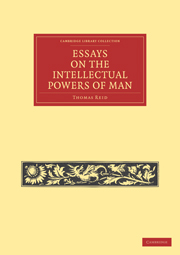Crossref Citations
This Book has been
cited by the following publications. This list is generated based on data provided by Crossref.
Proust, Joëlle
1996.
La folie dans la place.
p.
155.
Engel, Pascal
2007.
L’épistémologie sociale.
p.
81.
Di Lucia, Paolo
2008.
Idealtypen per una tipologia degli atti istituzionali.
Rivista di estetica,
p.
133.
GRYZ, Jarosław
2011.
MODERN SECURITY PARADIGM.
National Security Studies,
Vol. 2,
Issue. 1,
p.
71.
Sackson, Adrian
2014.
Avoiding Broken Noses.
European Journal of Pragmatism and American Philosophy,
Vol. VI,
Issue. 2,
Rysiew, Patrick
2017.
Judgment and Practice in Reid and Wittgenstein.
European Journal of Pragmatism and American Philosophy,
Vol. IX,
Issue. 2,
Thébert, Angélique
2017.
A Permissivist Ethics of Belief.
European Journal of Pragmatism and American Philosophy,
Vol. IX,
Issue. 2,
Brunson, Daniel J.
2017.
Common Sense without a Common Language?.
European Journal of Pragmatism and American Philosophy,
Vol. IX,
Issue. 2,
Ceglie, Roberto Di
2020.
Thomas Reid: Philosophy, Science, and the Christian Revelation.
Journal of Scottish Philosophy,
Vol. 18,
Issue. 1,
p.
17.
Wolf, Yaron
2021.
“A Memory within Change Itself.” Bergson and the Memory Theory of Temporal Experience.
Bergsoniana,
Fiocco, M. Oreste
2021.
There is nothing to identity.
Synthese,
Vol. 199,
Issue. 3-4,
p.
7321.
DUNCAN, MATT
2022.
Externalists Should Be Sense-Datum Theorists.
Journal of the American Philosophical Association,
Vol. 8,
Issue. 2,
p.
338.
Irikefe, Paul Oghenovo
2022.
How to be a Universalist about Methods in African Philosophy.
The Southern Journal of Philosophy,
Vol. 60,
Issue. 2,
p.
154.
Nie, Chenwei
2023.
Can a Bodily Theorist of Pain Speak Mandarin?.
Philosophia,
Vol. 51,
Issue. 1,
p.
261.
Anastassakis, Konstantinos
2023.
Androgenetic Alopecia From A to Z.
p.
313.
deRosset, Louis
and
Linnebo, Øystein
2024.
Abstraction and grounding.
Philosophy and Phenomenological Research,
Vol. 109,
Issue. 1,
p.
357.
Kana, Austin A.
Li, Wenzhu
van Noesel, Isabel
Pang, Yusong
Kondratenko, Aleksandr
Kujala, Pentti
and
Hirdaris, Spyros
2024.
State-of-the-Art Digital Twin Applications for Shipping Sector Decarbonization.
p.
161.
Pardo, Pere
Yu, Liuwen
Chen, Chen
and
van der Torre, Leendert
2025.
Weakest link, prioritized default logic and principles in argumentation.
Journal of Logic and Computation,



